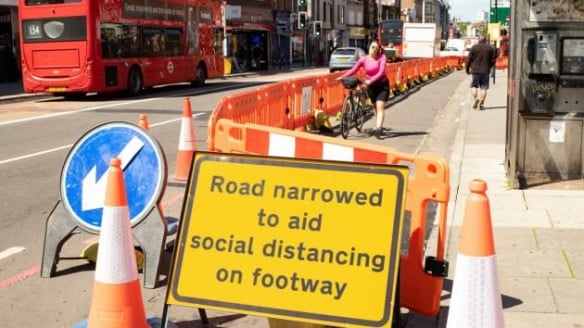
Camden High Street, London, May 2020 (photo credit: CNBC)
Habits are notoriously hard to change, and patterns of space use are among the most enduring: many cities retain their medieval layouts; today’s roads remarkably closely follow Roman ones.
Covid-19 is of course disrupting both good and bad habits, including street space use, as a result of additional space needed for social distancing of pedestrians, more cycling to avoid buses, and less cars due to teleworking.
No good crisis should go to waste, so what would be a good use of limited street space in cities?
A recently published paper “Fair street space allocation: ethical principles and empirical insights” by researchers in Berlin offers an excellent theoretical framework, which is then compared to actual street observations.
The paper starts with three normative perspectives on street space use: transport, sustainability, and well-being, suggesting the need to balance the implicit transport dominance.
Then it applies 10 ethical principles: Utilitarianism, Liberal equality, Capability Approach, Sustainability and intergenerational justice, Fair discourses, Recognition, feminist/critical theory, Socialist / Marxist, Environmental values / biocentric views, Communitarianism, Libertarianism.
For example, hypothetically Jeremy Bentham / John Stuart Mill would ask “How can street space allocation serve the goal of maximizing aggregate happiness?” to define utilitarianism. Or Jürgen Habermas “To what extent is street space allocation decided by procedures grounded in the equal moral status of persons?” to determine fair discourse. Robert Nozick would look at “How does street allocation affect the liberty of individuals?” to assess libertarianism.
From the three normative perspectives and ten ethical principles, 14 allocation mechanisms are derived, from equal modal share by space or distance, auctioning, Rawlsian justice from the transport or place normative perspective, local or global environmental efficacy, or wellbeing.
Comparing these 14 allocation mechanisms with empirical observations from 18 streets in Berlin identifies a huge mismatch between desirable and actual allocation. Especially car use is mismatched: 60% of space including parking for 17% of trips, or cycling, accounting for 18% of trips and 3% of space. Only 7 of 14 allocations were quantified, ranging from 2% to 38% of target car space, sharply down from today 60%. In other words car users occupy 3.5-times more space than others – no ethical allocation mechanism can justify this. The paper is especially critical of on-street parking, hard to justify under any logic, and challenges the “entrenched political economy of car dependence”.
Of course, the main biodiversity-related costs of car use are not even counted in this study focused on street space use, which makes an even stronger case to phase them out.
The paper’s importance however goes beyond cars. It explores using ethical principles to organize society to replace current structures, largely a consequence of accidents of history, occasionally helped by deliberate, self-interested manipulation.
Can economics as a discipline help in this and similar cases? As a social science studying how people make decisions about scarce resources, it should be in an ideal position to do so. Sadly, its history of distancing itself from other social sciences, and over-focus on tradable resources with a monetary equivalent makes this much harder.
As a student or practitioner of economics, here is your (and our collective) challenge: framing economic issues in the broader perspective of history, anthropology, sociology, and of course all natural sciences will help finally solve the “wicked” problems of our time, such as determining the optimal size of economy, level of globalization, or food system. This would make a difference in the well-being of real humans, as opposed to improving economic indicators, i.e. the well-being of the fictitious homo economicus.

